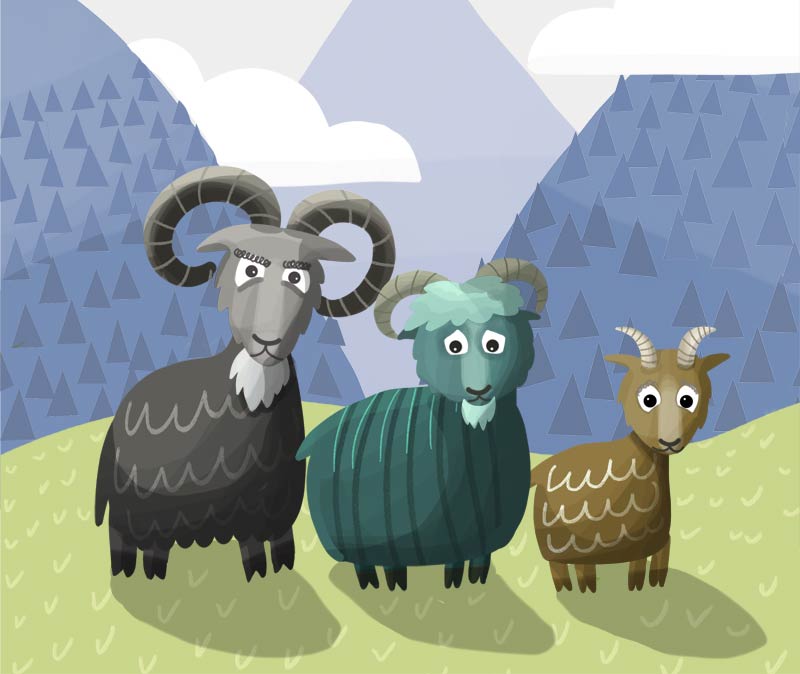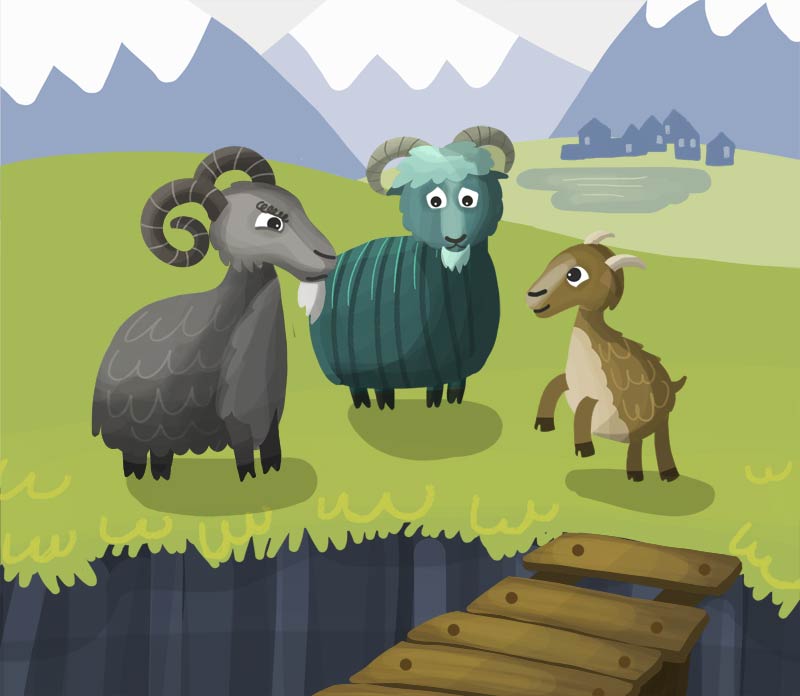Laissez-moi vous raconter l’histoire des trois boucs. Ils vivent dans les montagnes, dans un petit village de chèvres appelé Chèvreville.
Let me tell you the story of the three goats. They live in the mountains, in a small village of goats called Chèvreville (literally: Goattown).
Les trois boucs sont frères mais ils sont très différents. Le plus jeune des frères est le plus petit, le second né est le plus gros et le plus vieux est le plus fort.
The three goats are brothers but they are very different. The youngest of the brothers is the smallest, the second born is the biggest and the oldest is the strongest.
Comme vous le savez probablement, les chèvres mangent de l’herbe tout le temps. De l’herbe au petit-déjeuner… De l’herbe au déjeuner… De l’herbe au dîner. (Parfois elles prennent du gâteau au chocolat pour le dessert, mais d’habitude elles mangent juste encore plus d’herbe).
As you probably know, goats eat grass all the time. Grass for breakfast… Grass for lunch… Grass for dinner. (Sometimes they have chocolate cake for dessert, but usually they just eat more grass).
En été, il y a beaucoup d’herbe haute et verte à Chèvreville. Mais, l’hiver venu, les montagnes sont couvertes d’une épaisse couche de neige. Il n’y a plus d’herbe nulle part.
In summer, there is a lot of tall, green grass in Chèvreville. But when winter comes, the mountains are covered with a thick layer of snow. There is no more grass anywhere.
Cet hiver-là, devant ce problème, les trois boucs décident de descendre de la montagne pour trouver de l’herbe haute et verte dans le pré de l’autre côté de la ville.
That winter, faced with this problem, the three goats decide to come down from the mountain to find tall, green grass in the meadow on the other side of town.
Ils traversent la route (cataclop, cataclop),
... le village (cataclop, cataclop),
... l’étang (splish-splash, splish-splash),
... jusqu’à ce qu’ils arrivent devant un grand pont.
They cross the road (clip-clop, clip-clop),
... the village (clip-clop, clip-clop),
... the pond (splish-splash, splish-splash),
...until they come to a big bridge.*
Arrivent is the present subjunctive of arriver. We need to use it because we’ve said “jusqu’à ce que” (which means “until”), and this phrase needs us to use the subjunctive.
De l’autre côté du pont pousse l’herbe la plus haute et la plus verte que les boucs aient jamais vue. Ils tapent des pieds et remuent leurs queues. Miam, miam ! De l’herbe !
On the other side of the bridge grows the tallest and greenest grass the goats have ever seen. They stamp their feet and wag their tails. Yum, yum! Grass !
Aient = avoir (to have) in the present subjunctive (3rd person plural). We are using this because whether or not this is, in fact, the tallest, greenest grass the goats have ever seen is a judgement, rather than a hard fact.
Mais le pont est très long et très étroit. Un seul bouc peut traverser à la fois.
« Hé les gars, laissez-moi y aller en premier, dit le plus jeune bouc. Je suis le plus petit et le plus rapide. Je vais voir si le pont est sûr ! »
But the bridge is very long and very narrow. Only one goat can cross at a time.
“Hey guys, let me go first,” said the younger goat. “I am the smallest and the fastest. I'll see if the bridge is safe!”
« Si c’est ce que tu veux », disent les autres boucs, et le plus jeune des frères commence à traverser le pont.
"If that's what you want," say the other goats, and the youngest brother begins to cross the bridge.

Download this audio
Need help? How to download audio to your device




